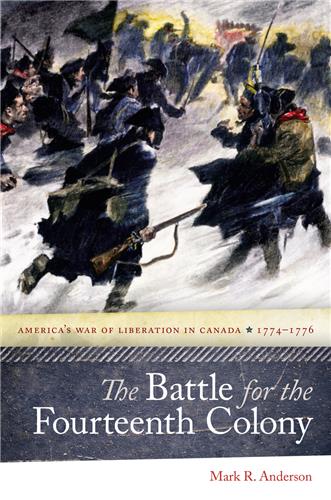Anderson makes a significant contribution to a neglected aspect of the American Revolution in this comprehensive, well-written monograph. . . . Anderson’s thorough description [of the December 31, 1775 attack] is a major strength of the book.
In this dramatic retelling of one of history’s great “what-ifs,” Mark R. Anderson examines the American colonies’ campaign to bring Quebec into the Continental confederation and free the Canadians from British “tyranny.” This significant reassessment of a little-studied campaign examines developments on both sides of the border that rapidly proceeded from peaceful diplomatic overtures to a sizable armed intervention. The military narrative encompasses Richard Montgomery’s plodding initial operations, Canadian partisan cooperation with officers like Ethan Allen, and the harrowing experiences of Benedict Arnold’s Kennebec expedition, as well as the sudden collapse of British defenses that secured the bulk of the province for the rebel cause. The book provides new insight into both Montgomery’s tragic Québec City defeat and a small but highly significant loyalist uprising in the rural northern parishes that was suppressed by Arnold and his Canadian patriot allies. Anderson closely examines the evolving relationships between occupiers and occupied, showing how rapidly changing circumstances variously fostered cooperation and encouraged resistance among different Canadian elements. The book homes in on the key political and military factors that ultimately doomed America’s first foreign war of liberation and resulted in the Continental Army’s decisive expulsion from Canada on the eve of the Declaration of Independence. The first full treatment of this fascinating chapter in Revolutionary War history in over a century, Anderson’s account is especially revealing in its presentation of contentious British rule in Quebec, and of Continental beliefs that Canadiens would greet the soldiers as liberators and allies in a common fight against the British yoke. This thoroughly researched and action-packed history will appeal to American and Canadian history buffs and military experts alike.


“A ‘Well done!’ to Mark Anderson for rescuing from history’s limbo the story of young America’s invasion of Canada.”
Thomas B. Allen
Anderson makes a significant contribution to a neglected aspect of the American Revolution in this comprehensive, well-written monograph. . . . Anderson’s thorough description [of the December 31, 1775 attack] is a major strength of the book.
Anderson’s dramatic chronicle of this fascinating, if often-ignored, campaign takes a close look at the Colonial plan to ‘liberate’ Quebec from the British and pull it into a confederation with the still-forming nation.
Anderson’s fascinating and important book makes it clear that there could have been a fourteenth colony. Anderson’s most original scholarly contribution is his revelation of the surprising degree of support the Americans and their gospel of liberty received from Canadians, both British and French. . . . Anderson demonstrates that significant numbers of Canadians rallied to the American rebels. Hundreds took up arms, becoming much-needed auxiliaries to the Americans.
The Battle for the Fourteenth Colony is an important contribution to the historiography of the opening days of the American Revolution. . . . [Anderson] provides critically needed context explaining the motivations, capabilities, and results obtained by a large cast of players and is a telling lesson in the value of deep archival research.
Anderson vividly describes the reasons why the Continental Congress thought an American invasion would pry Canada away from British control and expand American territory, falsely and fatally expecting the Canadians to embrace democracy and rise up against the British. In addition to the political ineptness, he also colorfully explains the petty bickering among American officers over rank, command prerogatives and strategy, which led directly to a flawed strategic plan that was undermanned, under resourced and doomed from the start.
Mark Anderson makes it clear that the American invasion of Canada in 1775 encountered a far more complex set of reactions than the indifference or hostility often supposed. In a meticulous political and military investigation, he demonstrates the revolutionary quality of the conflict and enables us to see that the invasion was mismanaged, but not doomed. An important and well-researched contribution to an important and misunderstood campaign of the war of independence.
A ‘Well done!’ to Mark Anderson for rescuing from history’s limbo the story of young America’s invasion of Canada. Why it happened, how it happened, and what the results were—all this is told in his scrupulously detailed book.
The American campaign to seize Canada at the start of the Revolutionary War is a fascinating chapter in colonial history, and Mr. Anderson tells the story superbly in a clear and articulate manner.
This is a masterful investigation of the patriot campaign to secure the involvement of Quebec Province as the fourteenth colony in the American rebellion against imperial Britain. A compelling story with surprising conclusions that deserves a wide readership.
Anderson examines how revolutionary activity in the American colonies merged with unrest in Canada, caused by the Quebec Act, to open the door to the American invasion. Anderson analyzes the important role that those living in Canada—habitants, seigneurs, and English and Americans who arrived after 1763—played in the campaign. This long-overdue book will become the definitive study of the invasion for years to come.
MARK R. ANDERSON is an independent historian and a retired U.S. Air Force officer who currently serves as a civilian military planner for the U.S. government. He earned his B.A. in history from Purdue University and his M.A. in military studies from American Military University.

Founded in 1971, Brandeis University Press is a nonprofit publisher dedicated to publishing innovative, high-quality books for a general audience, as well as scholarship that advances knowledge and promotes dialogue in the humanities, arts, and social sciences around the world.
© Copyright 2024, Brandeis University Press
Brandeis University Press
Goldfarb Library 69-235, MS 046
Brandeis University
415 South Street
Waltham, MA 02453
(781) 736-4547
pressinfo@brandeis.edu

Stay up to date with the newest titles and promotions from Brandeis University Press—while saving 20% on your first purchase.